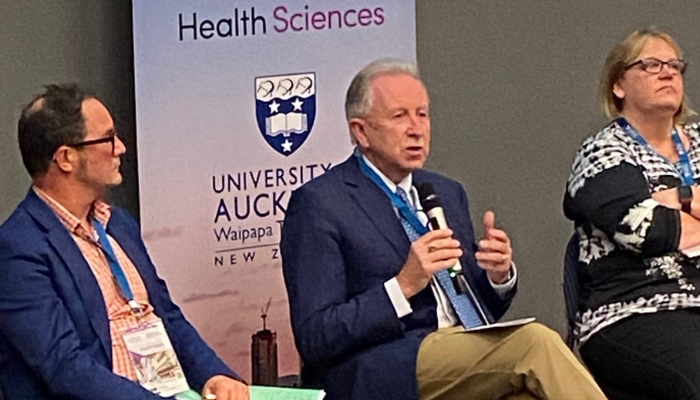Health equity – our unique makeup can best address critical issues today

Dean and Vice-President, Paul O’Byrne on health equity and how the Faculty of Health Sciences is focused on addressing this issue. ?
Message from Paul O’Byrne, Dean and Vice-President, Faculty of Health Sciences:
As I depart this year’s Universitas 21 (U21) Health Sciences Group event, hosted by the University of Auckland, I wanted to share how critical our role is in health sciences education, research and patient care.
U21 is a unique global network. It brings together 28 world-leading, research-intensive universities who share a common belief in the value of collaboration and internationalization.
This was the first in-person U21 event since 2019 and the shared energy was palpable as we collaborated and learned under the theme of this year’s meeting: Health Equity. As we see the continued shortage of health-care support and the related burnout felt by those doing the work, it requires a call to action for education, training and support. And we’re best equipped to meet that call.
I had the privilege of participating in a panel discussing ‘Women in Academia’ and had the opportunity to share the many advances being made at McMaster FHS, including the Hamilton Charter for promoting Gender Equity in Healthcare.
McMaster University’s Faculty of Health Sciences is the only Canadian university that combines, in one Faculty, schools of medicine, nursing, rehabilitation sciences, and the programs of midwifery, Bachelor of Health Sciences, physician assistant and postgraduate health sciences education. In this way, we train members of the medical team in a collaborative, interdisciplinary approach to develop effective and efficient health care, working together to provide the best patient care.
Our areas of research expertise are many, ranging from infectious diseases, to respiratory, digestive and child health and cardiac, stroke, thrombosis, cancer, aging, pain, health research methodologies and population health. In partnership with hospitals, government, health agencies and generous friends of the Faculty, we have 100 endowed chairs or professorships, which support researchers of the highest calibre; 38 Canada Research Chairs, which are given to the top scientists in their field; and 22 high-impact research institutes and centres.
In the Faculty of Health Sciences (FHS), we are advancing human and societal health and well-being through our culture of innovation, exploration, and collaboration, where we lead by learning what was, challenging what is, and optimistically embracing what could be. The well-being of our communities – including those caring for them – is a critical area of focus for us and important work is being done by our FHS community in support of health equity. Here are just a few recent examples:
- Studying the power of inclusive language in health care
- Racialized physicians call for race-based performance data on medical training and careers
- More demand for paramedic transports contributes to ED wait times
- How targeted communications for at-risk populations will help control spread of monkeypox
- GTA South Asian communities disproportionately hit by COVID-19
- Family Medicine partners with new Indigenous health-care centre
